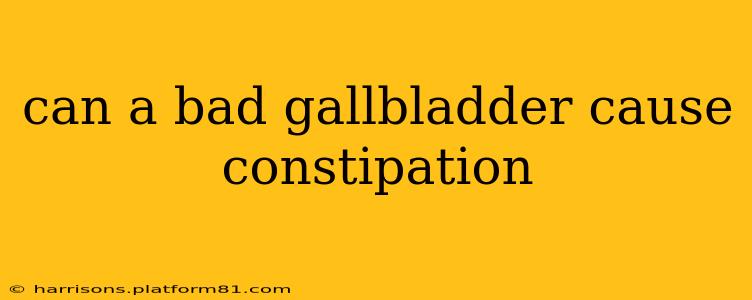The relationship between gallbladder issues and constipation isn't straightforward, but there are some indirect connections that can explain why some people experience both simultaneously. While a malfunctioning gallbladder doesn't directly cause constipation, several factors associated with gallbladder problems can contribute to irregular bowel movements.
What is the Gallbladder and How Does it Work?
Before diving into the connection between a bad gallbladder and constipation, let's understand the gallbladder's role. This small, pear-shaped organ stores bile, a fluid produced by the liver that aids in the digestion of fats. When you eat a fatty meal, the gallbladder contracts, releasing bile into the small intestine to help break down the fats. Problems arise when the gallbladder isn't functioning properly.
How Gallbladder Problems Might Lead to Constipation
Several gallbladder issues can indirectly influence bowel habits, potentially leading to constipation:
1. Changes in Diet and Medications:
- Dietary Restrictions: Individuals experiencing gallbladder problems often need to follow a low-fat diet to reduce the gallbladder's workload. This dietary change might inadvertently lead to a reduction in fiber intake, a crucial element for regular bowel movements. Insufficient fiber can cause constipation.
- Medications: Pain medications, often prescribed for gallbladder pain, can have constipation as a side effect. This is a common consequence of opioid pain relievers.
2. Pain and Reduced Physical Activity:
- Pain Avoidance: Gallbladder pain can be severe, making individuals less likely to engage in physical activity. Lack of exercise can slow down the digestive process and contribute to constipation.
3. Underlying Conditions:
- Other Digestive Issues: Gallbladder disease sometimes coexists with other digestive problems like irritable bowel syndrome (IBS), which can itself cause both diarrhea and constipation.
Can Gallbladder Removal Cause Constipation?
Gallbladder removal (cholecystectomy) is a common procedure for treating gallbladder diseases. While the surgery itself usually doesn't directly cause constipation, some patients report changes in their bowel habits afterward. This can be attributed to the following:
- Dietary Changes: The need to manage post-operative pain and adjust to a low-fat diet can again lead to decreased fiber intake and subsequent constipation.
- Changes in Bile Flow: Though the liver still produces bile, its flow may change after gallbladder removal, potentially impacting digestion and stool consistency. However, this is not a universally experienced effect.
What are the Symptoms of Gallbladder Problems?
It's important to note that gallbladder problems manifest in various ways. Common symptoms include:
- Severe abdominal pain (often in the upper right abdomen): This pain may radiate to the back or right shoulder blade.
- Nausea and vomiting: These symptoms are frequently associated with gallbladder attacks.
- Indigestion: Feeling full or bloated after eating small amounts of food.
- Fatty foods intolerance: Difficulty digesting fatty foods, leading to nausea, pain, or diarrhea.
- Jaundice: Yellowing of the skin or whites of the eyes (indicates a more severe problem).
When to See a Doctor?
If you are experiencing persistent constipation along with any of the symptoms listed above, it's crucial to seek medical attention. A healthcare professional can accurately diagnose the underlying issue and recommend appropriate treatment. Self-treating can delay proper diagnosis and management of underlying conditions.
Disclaimer: This information is for general knowledge and does not constitute medical advice. Always consult a healthcare professional for any health concerns or before making any decisions related to your health or treatment.
